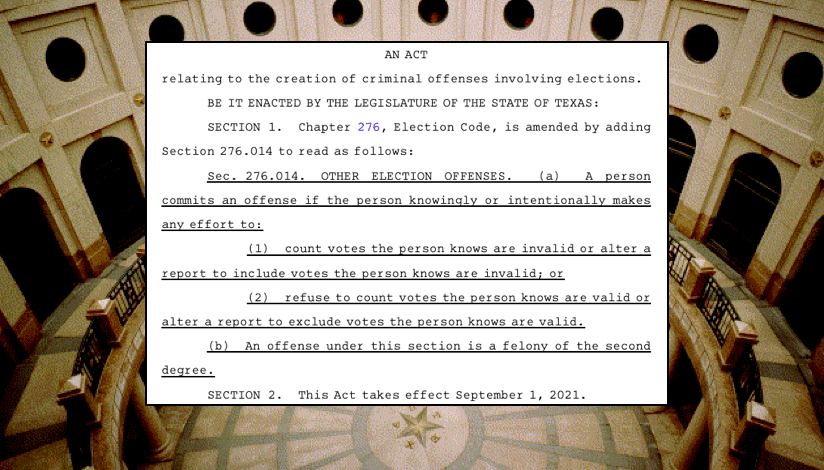UPDATED May 20.
With fewer than two weeks left in the legislative session, Texas lawmakers passed their first bill satisfying grassroots Republicans’ top-priority issue, election integrity.
On Wednesday, the House signed off on the Senate’s revised version of House Bill 574 by State Rep. Greg Bonnen (R–Friendswood), a bill identified by the Republican Party of Texas as meeting its election integrity policy goal to set felony penalties for election fraud crimes. The Senate signed the final bill on Thursday.
HB 574 is the first RPT-priority election reform to pass the Legislature this session, though Republican Gov. Greg Abbott gave election integrity fast-track emergency status back on February 1.
Thursday afternoon, the measure went to Abbott, who said in March he was ready to sign “robust” election reform bills sent to his desk.
Election integrity has been a Texas GOP platform plank and legislative priority for years.
After lawmakers failed to pass their priority election reforms in 2019, the RPT made election integrity its top legislative priority for 2021.
Members of the RPT’s Legislative Priorities Committee, along with an ad hoc Election Integrity Committee revived from last session, identified a total of 16 House and seven Senate bills that met their election integrity goals, including HB 574.
The one-page bill makes it a second-degree felony to “knowingly or intentionally” count invalid votes or refuse to count valid votes—new election fraud offenses created by the bill.
Bonnen’s original version of HB 574 made all election fraud offenses second-degree felonies. The final bill received bipartisan support in the House and Senate.
Grassroots leaders have called for lawmakers to deliver real results in the form of priority reforms sought by the RPT and other election integrity advocates, but most of these priorities are still in limbo.
The Senate passed five of its RPT-priority election integrity bills in April.
Two of these, Senate Bills 598 and 1234, require voting systems to produce auditable paper trails—a priority carried over from 2019 after lawmakers failed to pass it last session. Both bills passed the Senate with unanimous 31-0 votes.
SB 598 is awaiting action in the House Calendars Committee. Members must vote to place the bill on the House calendar in time for it to receive a second reading by March 25; otherwise, the priority measure is dead.
In addition to HB 574, the House has passed three other RPT-priority bills: House Bill 3276, a transparency bill providing for livestreamed video surveillance of ballot counting; House Bill 2339 (in the form of a substitute version of Senate Bill 155), a voter roll cleanup bill adding the attorney general to the list of officials who review voters who self-identify as noncitizens in response to a jury summons; and top-tier omnibus House Bill 6 (in the form of a substitute version of Senate Bill 7).
HB 3276 is set for a public hearing in the Senate State Affairs Committee on May 20.
SB 155 passed both chambers but in different forms, so the Senate must concur with House changes before the bill goes to the governor.
The biggest unknown remains SB 7. Senate- and House-passed versions of the bill are almost completely different.
All provisions of the original bill by State Sen. Bryan Hughes (R–Mineola) were wiped out when the House replaced the entire contents of SB 7 with the language in HB 6. The House also added multiple amendments before passing its version of SB 7.
A conference committee of five members each from the House and Senate will meet to reconcile the significant differences and try to hammer out a compromise version that both chambers must then approve.
Meanwhile, with the passage of HB 574, the Republican-controlled Legislature is a small step closer to getting grassroots’ priority election reform bills to the governor’s desk before the session ends on May 31.
Texas Scorecard is tracking the progress of key election integrity bills in the House and Senate through the end of session.





